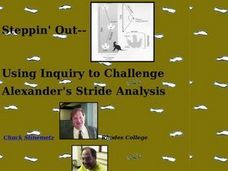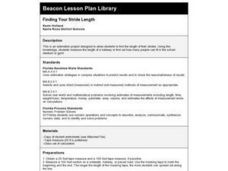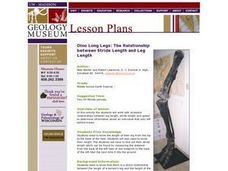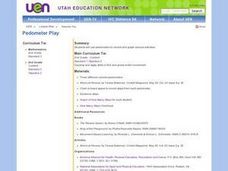Curated OER
Calculating Stride Length
How many steps does one take to walk a mile? The number of steps one walks in a mile would definitely depend on the length of his stride. Shorter people may take shorter strides, and taller people may take longer strides. This activity...
PBS
Take It in Stride
One step at a time, pupils practice their measurement techniques as they analyze their stride length. They design their own procedures for measuring and relate their stride measurements to the distance traveled by making calculations.
Curated OER
Dinosaur Tracks: From Stride To Leg Length To Speed
High schoolers determine the relationship between leg length, stride length, and speed in humans and bipedal dinosaurs. They collect data and graph these human characteristics then use actual data collected from dinosaur track pads and...
Curated OER
MUD-A Walk
Students investigate their tracks to determine the number of footsteps it takes to travel the entire length of their bodies. Then they determine the taller of two children and the shorter of two children with their tracks. Students also...
Curated OER
Steppin' Out: Using Inquiry to Challente Alexander's Stride Analysis
Students distinguish between walking, jogging and running trackways in humans. They analyze the phylogenetic progression of the leg position as described by pace width and angulation, comparing amphibians, reptiles and mammals. Research...
Curated OER
Finding Your Stride Length
Students participate in an estimation activity to determine the length of a hallway or to estimate how many people can fit in the school stadium or gym.
Curated OER
Fossil Formation
A fossil is worth a thousand words! Individuals craft their own amber fossil of an insect in addition to molds and casts of seashells. A third activity takes the lesson a notch higher: Learners measure stride lengths between tracks and...
Curated OER
Dino Long Legs
Students calculate the stride length of a walking or running animal. They use scale models of dinosaurs to calculate the leg and stride length of the animals.
Curated OER
Studying Fossils: Dinosaur Tracks From Stride to leg Length to Speed
Students explore dinosaurs. Students determine the relationship between leg length, stride length, and speed in humans and bipedal dinosaurs. Students analyze collected information. Based upon the data, dinosaur tracks, and fossils,...
PBS
Scale City — Proportional Relationships in the Real World
Strive to determine your stride. Scholars first view an informative video on the Kentucky Horse Park and the 28-feet stride of the Man o' War. They then work together in groups to find the length of their own strides by using the number...
Curated OER
Superhumans and Bionics: Building Hi-Tech Exoskeletons
Students explore how the body works. Students experiment and participate in activities to compare speed to stride length. Using the data collected, students draw conclusions about the biology of dinosaurs, their speed and stride length.
Curated OER
Scaling Our School
Fourth graders practice estimating the length and height of buildings at their school. They then compare their estimations with the actual heights or lengths. Each student then builds a scale model using ratio to translate the "real"...
Curated OER
Straights and Curves
Students stride the straights and walk the curves on a track in order to improve physical fitness. They work on varied lengths for the strides and walks.
Curated OER
Orienteering - Lesson 4 - Distance and Height
Pretend that you've been dropped onto a mountain, in the middle of nowhere, and all you have to find your way is a topographical map and a compass. Could you find your way to the nearest town? Orienteering teaches the skills of map...
Curated OER
Pedometer Play
Second graders use pedometers to record and graph various activities. Students discuss various activities that can be done during recess and the types of movements that are associated with each activity. They predict which activities...
Curated OER
Vincent VanDuca
Students create art with the Manduca by placing gel on their body and letting them walk over colored paper. They discover what their footprints and movements are like. They create a piece of art by using the Manduca markings.
Curated OER
Triangulation Experiment
In this triangulation worksheet, students solve and complete 11 steps of an experiment to determine the distance to a far away object using triangulation and trigonometry. First, they select a far away object and create a baseline far...
Curated OER
English Measurement System
Young scholars determine how to convert measurement. In this English Measurement lesson, students discover interesting facts about the history of measurement. Young scholars study formulas and practice using them.
Curated OER
What Do We Learn From Fossils?
Students investigate what a fossil is and how it came to be. In this fossil lesson, students examine pictures of skeletons and identify characteristics that can and cannot be determined by a fossil. Students complete diagrams of a...
Curated OER
Reading Comprehension: When Ants Go Marching, They Count Their Steps
In this comprehension worksheet, students read a short selection about ants, then answer 5 multiple choice questions. Answers provided.
Curated OER
Rover Races
Students simulate driving a rover on the surface of Mars. In this space science lesson, students identify the challenges experienced by astronauts in operating a vehicle. They recommend some changes to make their 'rover' better.
Curated OER
How Big is an Oil Tanker
Learners measure out 100 feet to get an idea of how long an oil tanker is. In this measurement lesson, students sketch an oil tanker using the appropriate scale, after they have an idea of how large an actual oil tanker is.
Curated OER
Pedometer Problem
In this pedometer instructional activity, students determine the distance walked. This one-page instructional activity contains 1 word problem. Answers are provided at the bottom of the page.
Curated OER
Walking Math into the Real World
Students measure an area given a yardstick. They also convert inches into a fractions of a foot and use data to create a linear graph.

























